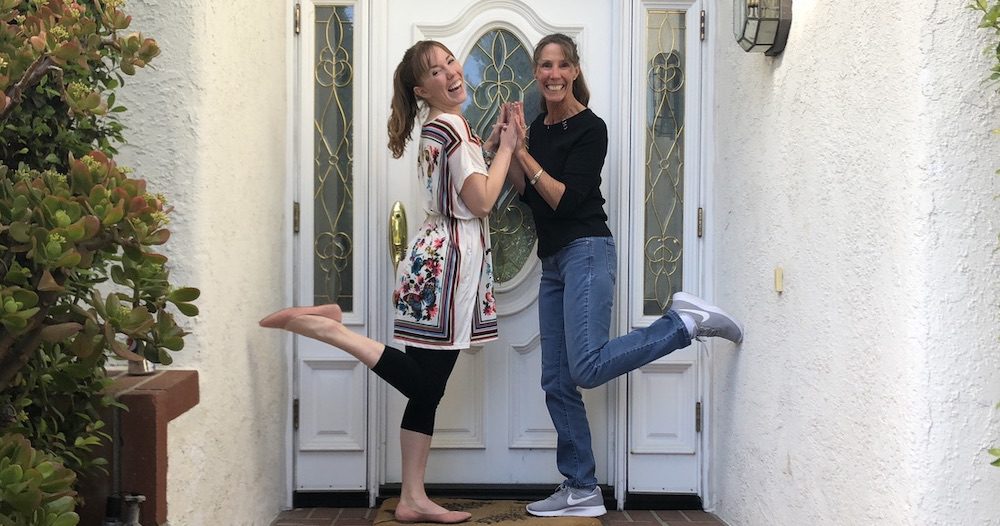Why I’m Grown-Up and Employed, but Still Need Mom to Co-Sign on My Home
When I got my first apartment after college, I needed my mom to co-sign my lease.
The landlord required proof that I made three times the rent, but since I wasn’t making nearly enough, I called Mom to sign on that second dotted line.
Then, in my mid-20s, when I bought my first condo, I needed a co-signer again. Once again, my mom was there for me.
Now I’m almost 30, married, and expecting our first child. Both my husband and I are gainfully employed and have good credit histories, so you’d think we wouldn’t need any parent co-signing for us to rent a home! But alas, we’d recently moved to New York City, where rents were so high, snagging a half-way decent apartment would require Mom to co-sign once again.
What’s going on? Would I need my mother to co-sign forever?
Of course, I feel lucky to have a parent who’s so supportive. But I can’t help but think that there’s something wrong with me, where I was choosing to live, or perhaps the housing system in general.
So, I started looking into why co-signing is so often required, even in cases where it seems unnecessary. Here’s what I learned, and some words of wisdom from experts that could help you get through the inconvenient (and embarrassing) cycle.
Why co-signers are required
What bothered me most about needing a co-signer was that I felt like I wasn’t being taken seriously as a tenant. I had a good job and a college degree, why couldn’t I be trusted to pay my rent?
As it turns out, many people face this problem.
While landlords may have differing requirements, the industry standard is that your take-home income must be three times what you pay in rent. So if you make $3,000 a month, your monthly rent should not exceed $1,000.
But is this realistic with today’s runaway rent prices?
For instance, in 2013, as a fresh college graduate, I paid $1,600 a month for a one-bedroom, third-floor walk-up in Los Angeles. So based on the three-times rule, I should have been earning $4,800 a month, or $57,600 a year.
A salary that size was an unattainable dream for me right out of college. Even though I had a great sales job and a minimum-wage side hustle, I was making only about twice the annual rent, or $40,000.
And I was one of the lucky ones. The minimum wage in California is $12 an hour, but in 2013 it was $8. To afford a monthly rent of $1,600 in 2013, a minimum-wage worker would have needed to put in 150 hours a week.
Is the three-times rent rule realistic?
Because I needed a co-signer, I couldn’t help but wonder about the three-times rent rule, and the reason for it. Did this mean I’d overextended myself?
As it turns out, I had no reason for worry. With a monthly rent of $1,600, I had another $1,600 left for other expenses, and it was more than enough.
So I started wondering: If twice my income worked just fine for my bills, why do landlords want proof that renters make three times their rent?
“The exact origins of the three-times rule is unknown,” says Michael Dinich of Your Money Geek. Nonetheless, this rule has remained the industry standard—for renters and home buyers alike.
“Mortgage lenders have often used the guideline that housing costs should be no more than 30% of income,” Dinich says. “The three-times rule is likely a handy approximation based on those old guidelines.”
This guideline may even contribute to younger generations’ low rates of homeownership.
“The income of many people, particularly younger adults, has not kept up with home prices in many areas,” says Andrew Lantham, managing editor of Super Money. “This is why millennials have lower homeownership rates than previous generations.”
Plus, experts say that most landlords (even the nice ones) don’t necessarily care if people aren’t making as much money as they used to. They care more about finding a renter who will be able to pay their rent on time. And if that means sticking to the tried-and-true method of renting to those who can prove they have plenty of income to spare, or can at least get a co-signer, they’ll do it.
How I pay my rent without a co-signer today
While it’s tough for young renters and home buyers almost everywhere to cover their housing costs, it’s even worse in New York City.
Sure, my mom agreed to co-sign the lease, as always. Yet with a baby on the way, my husband and I decided that, rather than taking my mom up on her kind offer, I’d try to find an apartment with a rent that fell comfortably within the three-times rule.
We started crossing things off our wish list. We moved our search from Manhattan to Brooklyn. We stopped looking at homes near subway stations and cute cafes and started touring apartments that were a bit farther out. In the end, we found a studio we liked, and the low rent didn’t require a co-signer.
The post Why I’m Grown-Up and Employed, but Still Need Mom to Co-Sign on My Home appeared first on Real Estate News & Insights | realtor.com®.
Homebuyers: For access to all listings and to find a homebuyers real estate agent that will represent only your interests call 800-935-6222 or click the button below to connect with MABA. At MABA we got you!

FIRST TIME HOMEBUYERS
First Time Home Buying in Massachusetts
 MABA Buyer Agents help first time home buyers reduce the stress and frustration normally associated with buying a home or condo – especially for first time home buyers.
MABA Buyer Agents help first time home buyers reduce the stress and frustration normally associated with buying a home or condo – especially for first time home buyers.
As a first time homebuyer in Massachusetts, you can turn to our non-profit organization to help you understand and navigate the complexities of the entire Massachusetts real estate transaction, from mortgage pre-approval until you are handed the keys to your new home or condominium. Each of our member buyer's brokers and agents works only for their buyer-clients and never for the seller of the home or condo that their buyers want to buy.
MABA Buyer Agents will take the time to learn about you and your real estate goals, help you understand your options, including first time home buyer programs, properties and/or condominium associations, estimate real property values and put together a negotiating strategy to help you increase the odds of getting your offer accepted in our competitive Massachusetts real estate market. After advocating to get your offer accepted, your MABA buyer's agent will be there for you at your home inspection and help you protect your deposit through the inspection, purchase & sale and financing contingency periods.
You can buy your first home or condo with confidence knowing that your MABA buyer agent is committed to saving you time and money and helping you make your best home buying decision.
Tags used in this Real Estate Homebuyer in Massachusetts blog post:
#HomeBuyers #BuyersAgent #Boston #ma #RealEstate #HomeBuying #Broker #home #homesforsale
Article From: "Jillian Pretzel" Read full article
Get Started with MABA
For no extra cost, let a MABA buyer agent protect your interests








